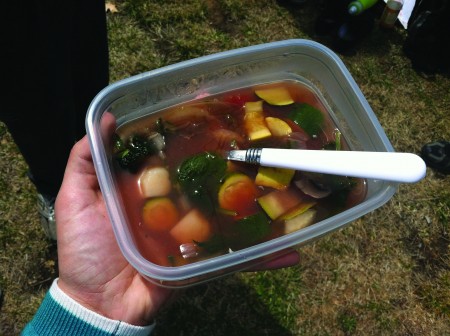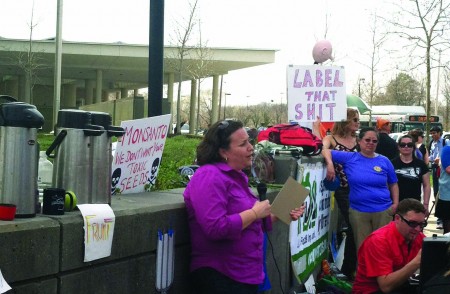Environmental science major Skyler Kopko was one of many at a protest against the Food and Drug Administration (FDA) in College Park, on April 8.
But instead of picket signs, Kopko and the other members of the Environmental Action Group (EAG) had soup.
“It’s kind of like a sit in but we ate soup,” Kopko said. “People brought donated vegetables for us.”
The EAG is an on-campus club that campaigns for environmental protection through action and education, encouraging students to take action for a plan for the future.
The Eat-In protest was organized by Occupy Monsanto, an organization aimed at getting people to take action against Monsanto, an agriculture company who uses Genetically Modified Organisms (GMOs) in the growing of their crops.
“[Occupy Monsanto] are working against GMOs and unsustainable farming,” Kopko said.
The protest’s demand was to have required labeling on all GMO foods.
“The protest was for more transparency on the GMO’s in our food,” Skyler said. “Currently it’s not labeled whether foods contain GMOs. Companies can voluntarily say, ‘Oh we don’t have GMOs’, but right now is not required for a company to disclose whether they have GMOs in their food.
The Eat-In protest brought the attention of some police forces due to the large number of people on the street corner, but no conflict arose.
“It was a totally peaceful protest,” Kopko said. “There wasn’t any civil disobedience or violence that a lot of people expect from protests.”
Even though the event was peaceful, it was noticed by onlookers as well as the FDA employees.
“It took up a whole street corner, where the FDA building and the Metro are, so people just driving by saw it,” Kopko said. “The people in the buildings couldn’t ignore it; it was right there, right by all of their windows.”
The protesters peacefully tried to get the attention of the FDA.
“Every fax machine in the building got a memo about the Eat-In,” Kopko said. “So they were totally aware that we were there. It’s a really good way to bring a lot people together. [Rather than] just sending in a letter or something, having it one day together at one time created a big visual message that a lot of people care about what they are eating.” Skyler and Occupy Monsanto argue that the FDA should require labeling GMOs because of the consumers’ right to know. “We want to be able to see you know which foods we’re eating have these GMOs in them,” Kopko said.
Kopko believes that more initiatives such as the protest will create the path that will lead to GMO labeling.
“More protests like this let the power know that we want labeling on the food—we want to know what we’re eating. So whether that’s writing letters or joining in protests people need to make it known that they want transparency.”
Kopko mentioned that The European Union currently labels their food. “Countries in Europe, they have GMO labeling on their food so it’s not totally unheard of.” The opposition comes from companies like Monsanto. “Monsanto, it’s in their best interest to not label foods, so they are really fighting against labeling,” Kopko said.
Labeling GMOs is one of the causes that Mason’s Environmental Action Group (EAG) supports. Kopko is part of EAG’s leadership which has organized several events for Earth Week and Earth Month.








Comments